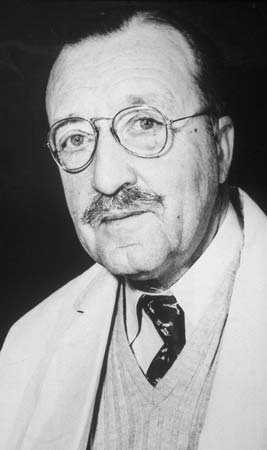Northrop, John Howard
American biochemist
born July 5, 1891, Yonkers, N.Y., U.S.
died May 27, 1987, Wickenberg, Ariz.
 American biochemist who received (with James B. Sumner (Sumner, James Batcheller) and Wendell M. Stanley (Stanley, Wendell Meredith)) the Nobel Prize for Chemistry in 1946 for successfully purifying and crystallizing certain enzymes (enzyme), thus enabling him to determine their chemical nature.
American biochemist who received (with James B. Sumner (Sumner, James Batcheller) and Wendell M. Stanley (Stanley, Wendell Meredith)) the Nobel Prize for Chemistry in 1946 for successfully purifying and crystallizing certain enzymes (enzyme), thus enabling him to determine their chemical nature.Northrop was educated at Columbia University, where he received his doctorate in chemistry in 1915. In World War I he was a captain in the U.S. Army Chemical Warfare Service.
During World War I Northrop conducted research on fermentation processes suitable for the industrial production of acetone and ethyl alcohol. This work led to a study of enzymes essential for digestion, respiration, and general life processes. At that time the chemical nature of enzymes was unknown, but through his research Northrop was able to establish that enzymes obey the laws of chemical reactions. He crystallized pepsin, a digestive enzyme present in gastric juice, in 1930 and found that it is a protein, thus resolving the dispute over what enzymes are. Using the same chemical methods, he isolated in 1938 the first bacterial virus (bacteriophage), which he proved to be a nucleoprotein. Northrop also helped isolate and prepare in crystalline form pepsin's inactive precursor pepsinogen (which is converted to the active enzyme through a reaction with hydrochloric acid in the stomach); the pancreatic digestive enzymes trypsin and chymotrypsin; and their inactive precursors trypsinogen and chymotrypsinogen.
Northrop was first an assistant at, and then a member of, the Rockefeller Institute for Medical Research in New York City from 1916 until his retirement in 1961, when he became professor emeritus. He was also a visiting professor of bacteriology and biophysics at the University of California at Berkeley (1949–58). His book Crystalline Enzymes (1939) was an important text.